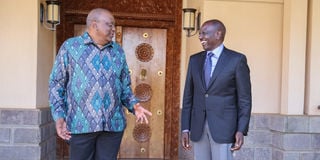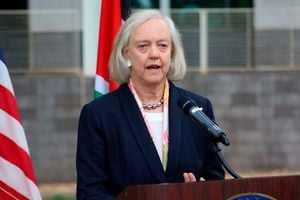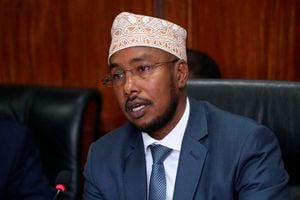
President William Ruto pays a courtesy call to former President Uhuru Kenyatta at his Gatundu home on December 9, 2024.
President William Ruto and his predecessor Uhuru Kenyatta have called for the urgent reconstitution of the electoral commission even as politicians continued to blame one another over the debacle that has delayed by-elections and 2027 election preparations.
The two called for “prompt resolution of the court matters” blocking the constitution of a panel to recruit electoral commissioners and stressed the need to reconstitute the poll agency “in a transparent manner”.
With competing interests among major political players, the Independent Electoral and Boundaries Commission (IEBC) remains a pawn in Kenya’s political chess game.
As buck-passing continues as to who carries the responsibility for the deadlock and the implications of the protracted vacuum to electoral credibility, a review of developments since the last elections points to how the country got to this dilemma.
President Ruto has been blamed for the failure to appoint the selection panel to begin the process of hiring new IEBC commissioners after orchestrating the removal from office of four following the disputed 2022 presidential election and the end of term for the chairperson and two commissioners.
Former Vice-Chairperson Juliana Cherera and commissioners Justus Nyang’aya and Francis Wanderi resigned while Irene Masit was removed after they were accused of attempting to block the declaration of Dr Ruto as the winner in the August 2022 elections.
President Ruto then constituted a selection panel led by Dr Nelson Makanda, but the team was kicked out before it could finalise the recruitment of the new poll commissioners. Their removal arose from widespread anti-government protests led by opposition chief Raila Odinga who listed the reconstitution of IEBC among the grounds for a cease-fire.
Subsequent talks between the government and the opposition sealed a deal on the appointment of a new selection panel. The National Dialogue Committee (Nadco) co-chaired by Wiper party leader Kalonzo Musyoka and National Assembly Majority Leader Kimani Ichung’wah recommended the membership of the selection panel be expanded from seven to nine.
Minority coalition
However, a legal dispute arose about a representative of the minority coalition to the panel. While Mr Musyoka has been rooting for Ms Koki Muli as the representative of the minority coalition, National Liberal Party (NLP) maintains that its candidate, Dr Augustus Kyalo, was duly elected for the seat on July 26.
Mr Musyoka has, however, accused the government of using underhand tactics to frustrate the establishment of a substantive commission. The delays, he insists, have been brought by people in the Kenya Kwanza regime who have rushed to court to appeal the High Court decision that gave Ms Koki the green light.
“The ball is in William Ruto’s court to tell his proxies to withdraw the matter in the Court of Appeal so that we move forward and have a functioning IEBC. They have wasted a lot of time. Let them withdraw the case that is State-sponsored. That was a tactic to delay the formation of the panel and then the IEBC,” Mr Musyoka said yesterday.
But NLP Secretary-General Omondi K’Oyoo blamed Mr Musyoka for the delay.
“It is unfortunate that a person of Kalonzo’s stature has chosen deception as his modus operandi. He must know that Kenyans are way ahead of him and understand the dictates of IEBC (Amendment Bill) 2024. Section 2(b)(iii) of the Bill is clear about minority party or coalition of parties. He should thus accept his candidate lost however painful it is because that is what democracy entails,” Mr K’Oyoo told the Nation.
Dr Kyalo appealed against the High Court verdict that overturned his win. The High Court in Kiambu also threw a spanner in the works after it stopped the Secretary to the Parliamentary Service Commission, Senate Clerk Jeremiah Nyegenye, from transmitting the names of the IEBC selection committee to President Ruto for appointment.
Justice Dorah Chepkwony further prohibited the Clerk from publishing or gazetting the names, pending the determination of the case.
The petitioner, Mr Boniface Njogu, had questioned whether the appointments comply with Articles 10 and 54(2) of the Constitution, which requires that the State to ensure the progressive implementation of the principle that at least 5 per cent of the members of the public in elective and appointive bodies are persons with disabilities.
On Monday, President Ruto, while meeting with his predecessor, said the speedy formation of a functional IEBC featured in their talks.
“President Ruto and President Kenyatta called for the prompt resolution of the court matters regarding the constitution of the IEBC selection panel, to facilitate the appointment of commissioners,” State House posted on its official Facebook page.
Mr Kenyatta, in a separate statement, said the matter should be resolved quickly.
“Further, to entrench Kenya’s democratic credentials, there is an urgent need to reconstitute the IEBC in a transparent manner. Continuous engagements are the solution to an all-inclusive democratic process,” Mr Kenyatta said.
Hours before this high-profile meeting between the two leaders, Prime Cabinet Secretary Musalia Mudavadi had reiterated the government’s commitment to the reconstitution of the IEBC.
Delaying process
“We need to complete the exercise of reconstituting the IEBC. Sometimes, you can keep on blaming the government. Sometimes rightly so and sometimes wrongly so. Because after the process has been done and then somebody goes to court ... the government being law-abiding, has to wait for the court process to be dispensed with. Those delaying the process are those who rushed to court to drag the reconstitution of the IEBC,” Mr Mudavadi said.
He questioned Mr Musyoka’s motive, wondering if he had gone to court to pursue a right or if it was a move he made because he has an ulterior motive to “make the government look awkward and that it does not want to reconstitute the IEBC”.
All these statements appear to be mounting pressure on the Wiper leader to stop the push for Ms Muli and let the process continue with the names initially on the list of the selection panel.
On Sunday, Deputy President Kithure Kindiki said the only reason the IEBC is yet to be reconstituted is because “some Kenyans went to court and filed an injunction against the establishment of the recruitment panel that is supposed to recruit the IEBC commissioners”.
“We are asking the parties that have taken this matter to court to try and reach an out-of-court settlement so that we can unblock that process and complete the reconstitution of the IEBC as soon as possible,” he said.
Narc Kenya leader Martha Karua however, faulted the President for harbouring a “vendetta against the Cherera four,” leading to their sacking barely a year after their recruitment in September 2021. She also accused Parliament of sleeping on the job and failing to speed up the process.
“I am aware that recently they passed a legal framework for getting an IEBC but the process is now held up by litigation. We urge the courts to speed up the process and free the country to get an electoral body,” Ms Karua said.
Constitutional Lawyer Bobby Mkangi lamented that “our constitutionalism and our democratic rights thereof are definitely lagging behind in the sense that we are living in times where we are disobeying our own constitution”.
“So, as a nation and as a State, we are embarrassing ourselves because it’s only in dysfunctional, almost banana-like republics, where you expect constitutional bodies and institutions not to be functioning properly, and in our case, actually not functioning properly because they are not even structurally sound,” he said.
He noted that already, there are those whose constitutional rights and political rights to representation have been directly limited since IEBC in its current form cannot conduct by-elections.
“But also, broadly, in the aspect of representation, we’ve not been able to reorganise or recalibrate our boundaries. We are still using a design that was proper as of 2012. It is a concern that political players want to prioritise their political interests more than what the broader public interest is,” added Mr Mkangi.
The dilly-dallying in the creation of the IEBC has also caught the eye of the European Union, with its Ambassador to Kenya Henriette Geiger expressing concern. While speaking at an event in Nairobi yesterday to mark Anti-Corruption Day, she said Kenya should already be preparing for the next elections.
She also revealed that the EU shall send a delegation, from the team of observers who were in Kenya to monitor the past elections, for a follow-up mission in February 2025 to engage with stakeholders to see what can be done to rectify the situation.
“Without IEBC, there cannot be any elections. We see with great concern that it is not yet in place because preparations should have started. This is not only for the by-elections but also for millions of youth who should be registered by now as well as the entire technology involved,” she said.












